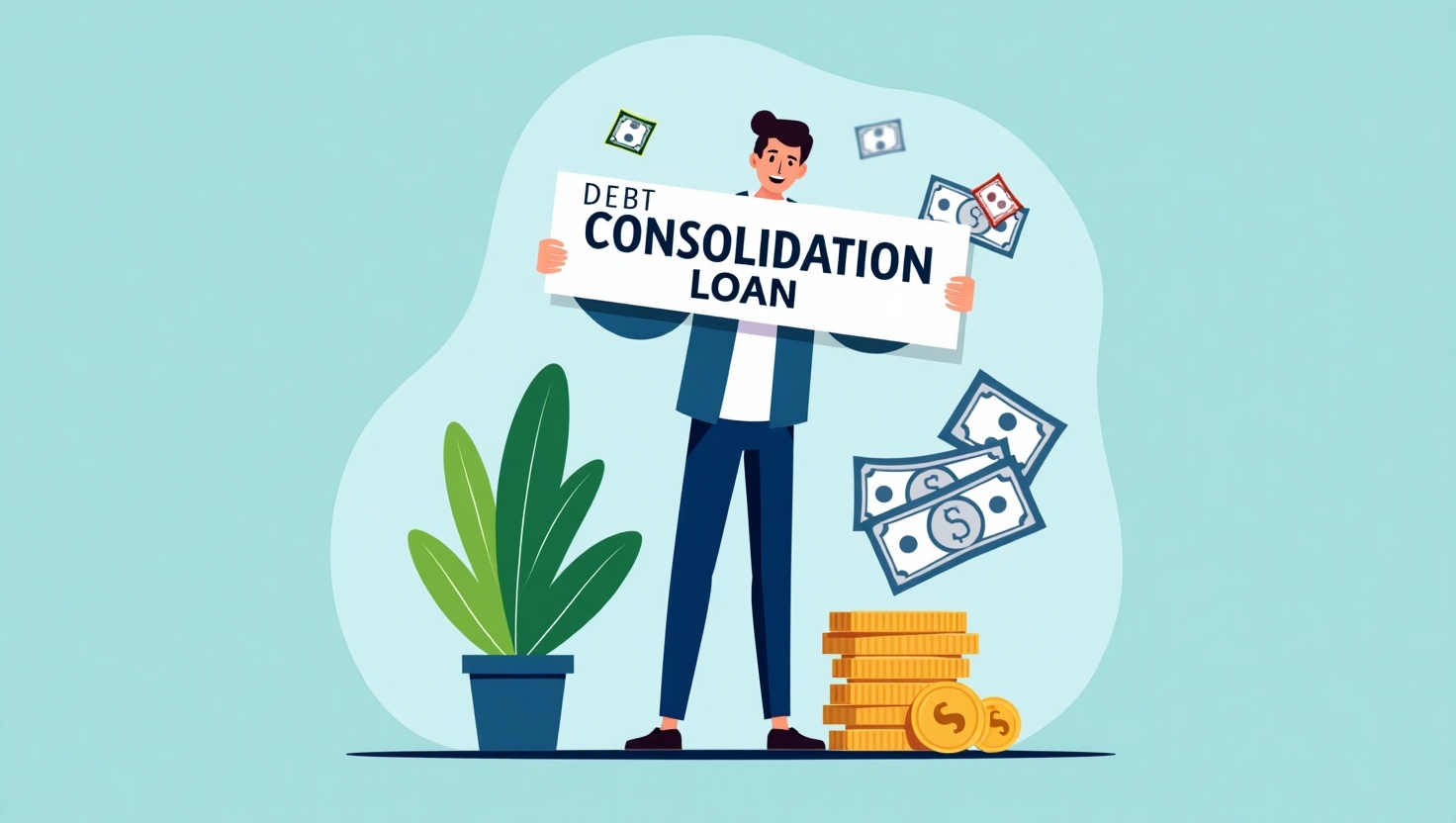
Are debt consolidation loans a good way to handle many debts, or do they have downsides? This is a big question for people with lots of debts. They can offer a single payment and lower interest rates. It’s key to look at the good and bad sides before deciding.
Debt consolidation loans can help make managing debt easier. But, it’s important to think about how they might affect your credit score and overall money situation. Knowing the pros and cons helps people decide if these loans are right for them.
Key Takeaways
- Debt consolidation loans can simplify debt management with a single monthly payment.
- Potentially lower interest rates can save money on interest payments.
- Understanding the pros and cons of debt consolidation loans is crucial for making informed decisions.
- Debt consolidation loans can impact credit scores, so careful consideration is necessary.
- Individuals should weigh the benefits and drawbacks of debt consolidation loans for their specific financial situation.
- Debt consolidation loans can be a valuable tool for managing multiple debts, but careful evaluation is necessary to determine if they are worth it.
Understanding Debt Consolidation Loans
Debt consolidation loans can help if you’re juggling many debts. They merge your debts into one loan with a lower interest rate. This makes paying back easier with just one monthly payment. It’s key to look into consolidation options and compare best debt consolidation companies to find the right fit for you.
Many debts can be consolidated, like credit card debt, personal loans, and medical bills. This can make managing your money simpler and might even save you money on interest.
- Credit card debt
- Personal loans
- Medical bills
Knowing how debt consolidation works and its benefits is important. By picking the right consolidation options and teaming up with a top debt consolidation company, you can manage your finances better. This path can lead to financial stability.
| Debt Type | Consolidation Option |
|---|---|
| Credit Card Debt | Balance Transfer Credit Card |
| Personal Loans | Debt Consolidation Loan |
The Impact of Debt Consolidation on Your Credit Score
Debt consolidation can greatly affect your credit score. This score is key for getting debt relief. When you consolidate, you merge several debts into one with a single interest rate and payment.
This change can impact your credit score in several ways. It can affect your credit utilization, payment history, and credit age. These are all important for your score. To avoid negative effects, pay on time and keep your credit use low.
- Make all payments on time to show you’re responsible
- Keep your credit utilization under 30% to prove you can handle debt
- Check your credit report often to make sure it’s correct
By following these tips, you can understand how consolidation impacts your score. This knowledge helps you make better choices for your financial health.
Key Benefits of Debt Consolidation Loans
Debt consolidation loans can greatly help in managing your debt. They offer several benefits that can make your financial life easier. When looking at how to choose a loan, it’s important to know the good and bad sides of debt consolidation.
Some of the main benefits of debt consolidation loans are:
- Single monthly payment: This makes it simpler to manage your debt by combining all payments into one.
- Potentially lower interest rates: You might save money on interest with a debt consolidation loan compared to your current debts.
- Fixed repayment timeline: You’ll know exactly when you’ll pay off your debt, helping you stay on track.
- Simplified debt management: With fewer accounts to keep track of, managing your debt becomes easier and you avoid late fees.
By following tips for managing debt and picking the right loan, you can take charge of your finances. This can lead to a debt-free future. Always think carefully about your options and choose a loan that fits your budget and needs.
| Benefit | Description |
|---|---|
| Single monthly payment | Simplifies payments and makes it easier to manage debt |
| Potentially lower interest rates | Saves money on interest payments |
| Fixed repayment timeline | Helps stay on track and pay off debt |
| Simplified debt management | Reduces the number of accounts to manage and avoids late fees |
Potential Drawbacks to Consider

Exploring debt consolidation loans means looking at the pros and cons. These loans can make managing debt easier and might lower interest rates. But, there are downsides to think about. One big risk is getting into more debt, even though it might feel like you’re getting out of a hole.
Debt consolidation loans can also affect your credit score. At first, your score might drop because of the new loan and the process of combining debts. But, paying on time and reducing your debt can help improve your score over time. It’s also key to watch out for fees like origination or balance transfer fees.
Some downsides of debt consolidation loans include:
- Risk of accumulating new debt
- Potential fees, such as origination or balance transfer fees
- Impact on credit scores, at least initially
Knowing these downsides and weighing the pros and cons helps make smart choices about managing debt. It’s important to have a solid plan and stick to it for financial success.
Debt consolidation loans can be a great way to manage debt, but it’s vital to be aware of the risks. By understanding these risks and taking steps to avoid them, you can use these loans to get back on track financially.
| Debt Consolidation Loan | Potential Benefits | Potential Drawbacks |
|---|---|---|
| Lower interest rates | Simplified debt management | Risk of accumulating new debt |
| Single monthly payment | Fixed repayment timeline | Potential fees |
Who Should Consider Debt Consolidation Loans?
Debt consolidation loans can help if you’re juggling many debts with high interest rates. They merge all your debts into one loan, making payments simpler. It’s important to see if these loans fit your financial needs.
People with several debts, like credit cards and personal loans, might find these loans helpful. They can lower interest rates and make payments easier. But, you should look at your finances carefully before choosing.
When thinking about debt consolidation loans, consider your credit score, income, and debt-to-income ratio. It’s also smart to compare different lenders to find the best deal. This way, you can understand the benefits and drawbacks of these loans and other options.
Debt consolidation loans can be a great way to manage your debt and achieve financial stability. By carefully looking at your finances and exploring all debt relief options, you can choose what’s best for you and your goals.
Find the Best Debt Consolidation Solutions – Struggling with multiple debts? Explore trusted debt consolidation options to simplify payments and reduce interest rates. Discover top lenders and expert tips here.
How to Choose the Right Debt Consolidation Loan
Choosing the right loan can be tough. With many options, it’s hard to pick the best one. It’s key to research and compare different lenders and their offers.
Start by finding best debt consolidation companies with good reputations. Look at their interest rates, fees, and repayment terms. Make sure they match your financial situation and goals.
Here are some key things to consider when choosing a debt consolidation loan:
- Interest rate: Look for a loan with a lower interest rate to save money on interest payments.
- Fees: Check for any additional fees, such as origination fees or late payment fees.
- Repayment terms: Consider the length of the repayment period and whether it fits your budget and financial goals.
By researching and comparing, you can find the best debt consolidation loan. This will help you on your way to becoming debt-free.
Important Factors in the Application Process
Applying for debt consolidation loans involves understanding key factors. The application process can be complex. But being prepared can make a big difference. Lenders need financial statements, credit reports, and ID to check if you’re creditworthy.
The credit score requirements vary by lender and loan type. A good credit score can help you get approved and get better rates. Lenders also check if you have a steady income to repay the loan.
To succeed in the application process, know what the lender needs. Be ready to provide the necessary documents. This way, you can avoid delays and boost your chances of getting approved for debt consolidation loans. Here are some factors that can affect the application:
- Credit score and history
- Income and employment stability
- Debt-to-income ratio
- Collateral or security requirements
By considering these factors and the loan terms, you can make a smart choice. This helps you find the best loan for your financial situation.
Tips for Success with Debt Consolidation

Debt consolidation can help manage debt, but it needs a solid plan. By using tips for managing debt, people can work towards being debt-free. It’s key to create a repayment plan that fits their financial situation.
It’s important to avoid new debt while paying off old debt. This can be done by debt relief solutions like cutting expenses, making a budget, and tracking spending. Also, having an emergency fund helps avoid debt from unexpected costs.
Here are some strategies for success with debt consolidation:
- Making timely payments
- Communicating with creditors
- Monitoring credit reports
By following these tips for managing debt and using effective debt relief solutions, people can reach financial stability. Always check and update the repayment plan as needed for success.
Common Mistakes to Avoid
When looking into debt consolidation loans, knowing common mistakes is key. These errors can lead to more debt, hurt your credit score, and cause stress.
To steer clear of these traps, it’s important to know what common mistakes to watch out for. Some include:
- Accumulating new debt while trying to pay off existing debt
- Missing payments or making late payments
- Not reading the fine print and understanding the terms of the loan
By knowing these common mistakes and avoiding them, you can make better choices about debt consolidation loans. This helps you achieve financial stability.
Remember, debt consolidation loans can help manage debt. But, it’s crucial to be cautious and think carefully. By avoiding common mistakes and making smart decisions, you can control your finances. This leads to a better financial future.
Debt Consolidation Loans: Are They Worth It?
Thinking about debt consolidation loans? It’s key to look at both sides. These loans can help if you have many debts, by combining them into one payment. But, make sure the loan terms are good for you.
Whether to get a debt consolidation loan depends on your financial health, credit score, and how much debt you have. Understanding the pros and cons is crucial. Look at the interest rate, how long you’ll pay it back, and any fees.
Key Decision Factors
- Interest rate: Is the interest rate lower than the current rates on your debts?
- Repayment term: Is the repayment term reasonable, and can you afford the monthly payments?
- Fees: Are there any fees associated with the loan, and are they reasonable?
When to Proceed
If you think debt consolidation loans are for you, be careful. Read all the details, understand the terms, and ask questions if you’re not sure.
When to Consider Alternatives
Not sure about debt consolidation loans or have a complex financial situation? Think about other options like credit counseling or debt management plans. These might offer a better fit for your financial needs.
Debt Consolidation Loans : Conclusion
Whether debt consolidation loans are worth it depends on your financial situation and goals. These loans can simplify your payments, lower interest rates, and set a fixed repayment plan. But, they also have downsides to think about.
It’s important to approach debt consolidation with a clear plan. Knowing the pros and cons helps you make a choice that fits your financial needs. With the right strategy and discipline, these loans can help you achieve financial stability and work towards being debt-free.
Debt Consolidation Loans : FAQ
What is a Debt Consolidation Loan?
A debt consolidation loan helps you combine several debts into one. This includes credit card balances, personal loans, or other bills. You get a single monthly payment with possibly lower interest rates.
How Does Debt Consolidation Work?
Debt consolidation involves getting a new loan with a lower interest rate. You use this loan to pay off your existing debts. This simplifies your payments and can help you pay off debts faster.
What Types of Debt Can I Consolidate?
You can consolidate many types of debt. This includes credit card balances, personal loans, and medical bills. Common debts to consolidate are credit card debt, student loans, and personal loans.
How Can Debt Consolidation Affect My Credit Score?
Debt consolidation can both help and hurt your credit score. It can improve your credit utilization ratio and payment history. However, applying for the loan may temporarily lower your score.
What are the Key Benefits of Debt Consolidation Loans?
The main benefits of debt consolidation loans are clear. You get a single monthly payment, possibly lower interest rates, and a fixed repayment plan. These features make managing your debt easier and can improve your financial situation.
What are the Potential Drawbacks of Debt Consolidation Loans?
Debt consolidation loans have some downsides. They can lead to new debt, come with fees, and affect your credit score. It’s crucial to weigh these risks before deciding if a consolidation loan is right for you.
Who Should Consider Debt Consolidation Loans?
Debt consolidation loans are best for those with multiple debts. This includes credit card balances, personal loans, or medical bills. However, it’s not the best option for everyone. Other debt relief options might be better in some cases.
How Do I Choose the Right Debt Consolidation Loan?
Choosing the right debt consolidation loan requires careful comparison. Look at interest rates, fees, and repayment terms from different lenders. Work with reputable companies and consider your financial situation to make the best choice.
What Documentation is Required for a Debt Consolidation Loan?
To get a debt consolidation loan, you’ll need to provide some documents. These include proof of income, details about your debts, and identification. Lenders may also check your credit and financial statements to determine your loan terms.
What Tips Can Help Me Succeed with Debt Consolidation?
Success with debt consolidation requires a solid plan. Avoid new debt, build an emergency fund, and make timely payments. Budgeting and tracking expenses are also key to financial stability through consolidation.
What Common Mistakes Should I Avoid with Debt Consolidation Loans?
Avoid common mistakes with debt consolidation loans. Don’t accumulate new debt, miss payments, or overlook loan terms. Being thorough in your research and decision-making is crucial for success.
Are Debt Consolidation Loans Worth It?
Whether debt consolidation loans are worth it depends on your financial situation and goals. Consider the pros and cons, your ability to make payments, and if it fits your long-term plan. In some cases, consolidation is helpful, but other options might be better for you.








1 thought on “Debt Consolidation Loans: Are They Worth It?”